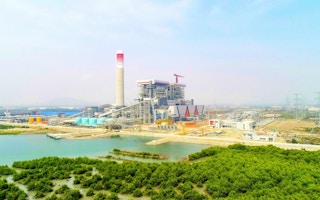A year after President Xi Jinping vowed to stop new coal-fired power projects abroad, several Chinese companies have signed new agreements to participate in overseas coal plants, making China now responsible for 61 per cent of all planned coal power capacity additions in the world.
To continue reading, subscribe to Eco‑Business.
There's something for everyone. We offer a range of subscription plans.
- Access our stories and receive our Insights Weekly newsletter with the free EB Member plan.
- Unlock unlimited access to our content and archive with EB Circle.
- Publish your content with EB Premium.
China’s relative share of the global coal plant pipeline jumped from 54 per cent from last year mainly due to its new coal plans expanding by an additional 30 gigawatts (GW) to 290GW.
In its new Global Coal Exit List (GCEL), German environmental non-profit Urgewald found that although 13GW of its coal projects have already been shelved, exceptions were made for the 30GW of overseas coal which are already under construction as well as for some of the projects, which had already received permits.

Source: GCEL
For instance, the plans for Phulbari date back to before Xi Jinping’s announcement from September 2021.
But two coal power plants in Laos and two captive coal power plants in Indonesia signed by China Energy Engineering Group and China Western Power are completely new, post-ban developments which directly contradict the “no new overseas coal” pledge.
All in all, the new coal-fired capacity to be developed under these agreements totals 9.7GW.
“We have observed China’s behaviour in the energy sector long enough to know that the devil is in the details. President Xi Jinping’s September 2021 pledge sounded grand and all-encompassing, but did not actually cover all overseas coal projects in China’s pipeline,” Heffa Schuecking, director of Urgewald, told Eco-Business.
The GCEL study also showed that among the 20 biggest companies expanding supply of the dirty fuel, more than half are Chinese companies.
According to GCEL researchers, other than six Chinese firms which traditionally sits at the top of the list, many of the companies mentioned this year are newcomers. These include Huaihe Energy Holding Group Co Ltd, Anhui Province Energy Group Co Ltd (Wenergy Group), Inner Mongolia Energy Generation & Investment Group, China Resources Power Holdings Co Ltd, and Jinneng Holding Shanxi Electric Power Co.
China also led coal production with 570 million tonnes mined by China Energy Investment Corporation last year. It was closely followed by Coal India, which produced 557 million tonnes of thermal coal.
“
We have observed China’s behaviour in the energy sector long enough to know that the devil is in the details. President Xi Jinping’s September 2021 pledge sounded grand and all-encompassing, but did not actually cover all overseas coal projects in China’s pipeline.
Heffa Schuecking, director, Urgewald
World’s refusal to end coal
Although last year’s United Nations climate summit in Glasgow ended with an agreement to “accelerate efforts towards the phase down of unabated coal”, nearly half of the coal industry intends to develop new projects to exploit the world’s dirtiest fossil fuel.
Out of the 1,064 companies in the GCEL database, 490 are developing new coal power plants, new coal mines, or new coal transport infrastructure.
“While the warnings issued by the Intergovernmental Panel on Climate Change and United Nations Environment Programme become more and more dire from one UN climate summit to the next, our data regarding companies’ transition plans remains depressingly consistent,” said Schuecking. “The vast majority of companies on the GCEL still have no intention of retiring the coal assets, which are propelling us towards a breakdown of our climate systems. A real transition requires clear and near coal exit dates.”
The research, which represents the world’s most comprehensive public database on the coal industry, said out of the companies surveyed, only 56 companies had announced timely coal exit dates, with many of them astonishingly late.
US company Berkshire Hathaway Energy, which operates 14 coal plants through its subsidiaries, has announced it will retire its coal-fired units by 2049. South Korea’s KEPCO as well as the Japanese trading houses Marubeni and Mitsubishi have declared that they will phase out their coal-fired generation by 2050.
Schuecking said: “While China is obviously our biggest problem here, we still shouldn’t forget that new coal plants are also planned in 35 further countries. It is also important to note that many Western financial institutions are still invested in Chinese coal power developers and are therefore also part of the problem.”

















